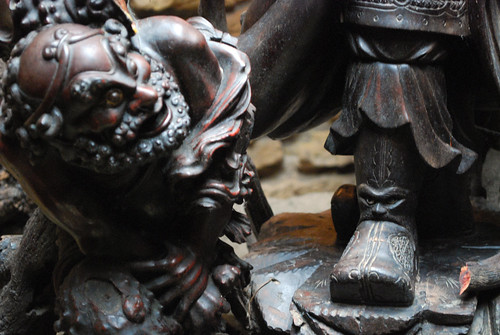From "A Losing Game," by
J. F. Powers, collected in
The Stories of J. F. Powers (2000)
Father Fabre, coming from the bathroom, stopped and knocked at the pastor’s door—something about the door had said, Why not? No sound came from the room, but the pastor had a ghostly step and there he was, opening the door an inch, giving his new curate a glimpse of the green eyeshade he wore and of the chaos in which he dwelt. Father Fabre saw the radio in the unmade bed, the correspondence, the pamphlets, the folding money, and all the rest of it—what the bishop, on an official visitation, barging into the room and then hurriedly backing out, had passed off to the attending clergy as “a little unfinished business.”
“Yes? Yes?”
“How about that table you promised me?”
The pastor just looked at him.
“The one for my room, remember? Something to put my typewriter on.”
“See what I can do.”
The pastor had said that before. Father Fabre said, “I’m using the radiator now.”
The pastor nodded, apparently granting him permission to continue using it.
Thus begins my favorite of J. F. Powers's stories, an opening that makes me laugh every time. Father Fabre, we know almost instantly, is up against a force stronger than he is: his pastor is a master of obstruction and obfuscation, instintively throwing up impenetrable roadblocks to any request while ever maintaining what in a more openly political context would be called plausible deniability.
Powers's stories, as well as his two novels, are almost exclusively concerned with priests, and Father Fabre's pastor could serve as an extreme example of the form in which Powers paints them: creatures not of faith but of habit, routine, and drudging vocation, believing in rules far more than in verities, and relentlessly focused on the here and now, the everyday, the earthly. Most of Powers's priests in fact are far more worldly than the pastor in this story: the main character of his enchanting novel
More D'Urban (which won the National Book Award in 1963), Father Urban, for example, is as worldly as his overly symbolic name would suggest. He drives a fine (borrowed) car, gives talks to Chamber of Commerce sorts, and spends as much time in the company of successful businessmen as did any of the philistines who provoked Jesus' wrath.
For these men, though the priesthood may once have been a calling, it is now a job; they have surrendered not to faith but to the daily dictates of the hierarchy that stretches above them. They live on the verge of society (a very late-1950s society at that, whose clubs and restaurants and social groupings are of particular interest to a reader encountering them half a century later), respected yet at the same time never quite allowed in; it is an awkward position, and in many of Powers's priests we can see pure (or rather impure) yearning for that apparently simpler--and more obviously remunerative--life.
James Wood, in
The Irresponsible Self, writes,
[Graham] Greene is enjoyed by Catholics in part, one suspects, because his pessimism is not threatening. He tells us, in effect, that the religious life is more complicated than we imagined, which ultimately consoles us. But Powers is very threatening, and ought not to be easily enjoyed by Catholics, because the cumulative suggestion of his work is that the religious life, at least for priests, has become practically unattainable. Hardly ever, in over a thousand pages of fiction, do we see one of Powers's priests reflect spiritually on a spiritual matter. . . . [T]hey are slaves to what Kierkegaard attacked as "Christendom"--the business of priestly activity rather than the practice of Christian witness, love of the world rather than imitation of Christ.
Wood is right that Powers's stories are more about work than about faith, but at the same time I think he is a bit too quick to see despair of religion in them. Yes, Powers's priests spend their days worried more about their building funds than their parishioners' souls, about their frustrations with the housekeeper than the difficulties of faith, but his refusal to portray these men as anything
but workers with a job to do affords their rare moments of actual testing--of principle, if not necessarily of faith, in action--all the more powerful. After a lifetime of mostly thoughtless self-indulgence, Father Urban achieves a certain grace when unexpectedly forced to make an ethical choice; similarly, in the moving (yet still hilarious) sequel to "A Losing Game," "The Presence of Grace," Father Fabre's pastor reveals that the very weapon of rebarbative inarticulacy that he uses out of habit against his curate can also be deployed in support of human love and kindness (of which he may know more, it turns out, than the inexperienced Father Fabre.)
I can't speak for Catholics, or even for believers, being neither. But as a reader, I find that Powers's priests--with their mix of daily spiritual failures and occasional moral triumphs--feel not just real, but inspiring in a way that, say,
Tolstoy's self-denials and hectoring in the pursuit of the purity of Christ could never be. Their lives and the petty frustrations thereof are recognizable and familiar, a reminder that no matter our spirituality, we are all always compromised, could always be better, do more.
These questions of faith and grace should not cloud the fact that Powers deserves better than to be pigeonholed as solely a Catholic writer, a label that has been responsible, it would seem, for at least a part of the benign neglect into which he's fallen over the years. As I wrote above, these are largely stories about work, and Powers is as astute as any writer at understanding and depicting the relationships (good and bad) between bosses and employees, colleagues and contacts, and all the mistakes, compromises, and petty brutalities we can't help but encounter in earning our daily bread.
His prose is precise, even delicate, yet frequently very funny, his dry wit driven by understatement and irony.
V. S. Pritchett is the first writer he brings to mind,
Penelope Fitzgerald another. This passage from "A Losing Game," which finds Father Fabre and his pastor in the junk-filled basement, gives an idea of his eye for telling detail, as well as the elegance of his comedy:
It was impossible to decide what it all meant. In the clothes tree alone, Father Fabre noticed a cartridge belt, a canteen stenciled with the letters U.S., a pair of snowshoes, an old bicycle tire of wrinkled red rubber, a beekeeper's veil. One of Father Fabre's first services to the pastor had been to help John carry two workbenches into the basement. At that time he had thought the pastor must have plans for a school in which manual training would be taught. Now he felt that the pastor had no plans at all for any of the furniture and junk. A few of the unemployed statues when seen at a distance, those with their arms extended, appeared to be trying to get the place straightened up, carrying things, but on closer examination they, too, proved to be preoccupied with a higher kind of order, and carrying crosiers.
The last few lines, with their half-serious, wholly futile attempt to discern meaning amid chaos, remind me of no one so much as
Anthony Powell, while the sheer exhaustion of Father Fabre's survey calls to mind poor
Bartleby. Fans of any of the writers I've named could do far worse than picking up the three Powers volumes published by the
New York Review of Books: the volume of stories and the novels
Morte D'Urban and
Wheat That Springeth Green.
"Comic realism," James Wood writes, "attends to the human exception, . . scathes our pretensions and blesses our weaknesses." What better time than than the holidays for such generosity of spirit?







